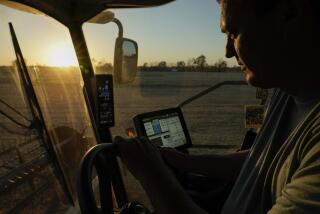Dixie Crop Losses Pass $2 Billion; Farmers Face Ruin
- Share via
Estimates of crop losses in the Southeast’s worst drought in a century soared past $2 billion Wednesday, and Maryland officials said 10% of that state’s farmers face ruin because they will not have enough crops to pay off debts.
There “just isn’t any hope for a lot of farmers. . . . I advise them to quit while they’re ahead,” said Wayne A. Cawley Jr., Maryland’s secretary of agriculture.
One in 10 of Maryland’s 18,000 full- and part-time farmers is “likely to encounter financial ruin” because of the drought, Gov. Harry Hughes said in a letter asking for aid from U.S. Agriculture Secretary Richard E. Lyng. He said one-third of the state’s farmers are in financial straits and crop losses are approaching $118 million.
Fans Offered
Unusually hot weather on the Southern Plains, with highs up to 110 degrees, led agencies to offer help with fans, shelter or advice in parts of Arkansas, Oklahoma, Missouri and Tennessee.
Record highs Wednesday included 108 degrees at Wichita, Kan.; 107 at Little Rock, Ark., and Springfield, Mo.; 104 at Memphis, Tenn.; 103 at Macon, Ga.; 101 at Tupelo, Miss.; and 100 at Mobile, Ala., and New Orleans, the National Weather Service said.
Bill Barlow of the National Severe Storms Center in Kansas City said upper air patterns suggest that the heat will not press too far eastward, and that the Southeast might cool off over the weekend. But he said he did not expect widespread heavy rain over the drought region, where estimates of crop losses totaled $2.3 billion.
Disaster Areas
The U.S. Agriculture Department declared 39 South Carolina counties natural disaster areas, clearing the way for farmers to apply for a variety of disaster loans, officials said Wednesday.
Hay donation efforts to feed cattle in the dry Southeast continued across the country, and the National Farmers Union in Denver set up a national hot line to collect information for state officials in the Southeast on farmers who can supply hay.
The drought also is taking its toll on people who rely on their vegetable gardens to help feed their families.
‘Freezer Usually Full’
Neva Croom, 71, of Pansy, Ala., usually spends the summer canning and freezing vegetables for the winter. “The freezer is usually full this time of year, but not now,” she said.
“This year, I had to buy tomatoes. Ours just burnt up out there. Yesterday, we bought a hamper of beans from a neighbor.”
More to Read
Sign up for Essential California
The most important California stories and recommendations in your inbox every morning.
You may occasionally receive promotional content from the Los Angeles Times.












